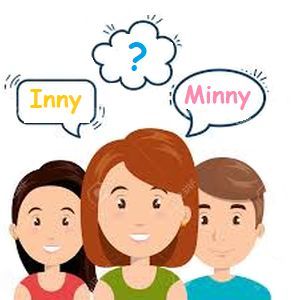Just ♥ Words—You Say Potato. I say Po...
 By my reckoning, we're at the onset of the next GREAT VOWEL SHIFT. Okay, maybe not "great," but it feels like a vowel shift, nonetheless.
By my reckoning, we're at the onset of the next GREAT VOWEL SHIFT. Okay, maybe not "great," but it feels like a vowel shift, nonetheless.
So what's the Great Vowel Shift, you ask? Well, it took place in England, from approximately 1400-1700, when vowel sounds underwent a profound change. But MORE on that LATER.
The current vowel shift I'm referring to involves the pronunciation of the letters A and E—not the LONG form as in mate or meet, but the SHORT form, mat or met.
Have you noticed the pronunciation for the following words—ANY… MANY… CAN… MEN… BEEN… WHEN… GET? There are more, but these are enough for argument's sake.
If you listen carefully when people speak, you can hear a short-i creeping in? Not the long vowel as in iPhone but the short—as in Fitbit.
Here's what it sounds like—
• Hello. Do you have INNY donuts?
• How MINNY would you like?
• KIN you give me a couple of dozen?
• Sure, even more.
• OK, stop WHIN you get to 100.
Or it sounds like this—
• Now is the time for all good MIN to come to the aid of their country.
A Southern regionalism, you might say. But it's not. You can hear it on national TV, radio, podcasts, and film—and from people in all parts of the country.
So what's happening? Phonetics—it's all about PHONETICS.
Think how much easier it is to say "MIN" rather than "men" … or "INNY" rather than "any." It's easier because the mouth doesn't have to open as widely and the tongue can rest more comfortably in the middle. Phonetically, it's just NOT AS MUCH WORK.
Let's get back to the Great Vowel Shift. No one knows precisely when or where in England it started, or why (theories abound), but the end result was a NOTICEABLE CHANGE in vowel pronunciation.
Mostly it affected the long vowels. BITE once sounded like beet, MATE like maht, BOOT like boat—only three examples, but you get the idea.
Today, some 300 years later—during our own not-so-GREAT VOWEL SHIFT—I wonder if we're KILLLING OFF the short A and E vowels, particularly when followed by the CONSONANT N. I'm as guilty as the next of homicidal tendencies.
Try saying the following words—ones for which I find myself replacing the en sound with in. Here they are: INCOUNTER … INDEAR … INGRAVE … INJOY … INLIVEN … INSURE … INTANGLE … INVELOP (the verb form) … INVIRONMENT. (Don't worry, the spelling won't actually change, just pronunciation.)
Languages are like living organisms, evolving over time. Usually we think it means a change in word usage or the addition of new words to the dictionary, but it also refers to pronunciation. Language is living history, and it SOUNDS like we're in the midst of it.
Site by BOOM
![]()
LitLovers © 2024
